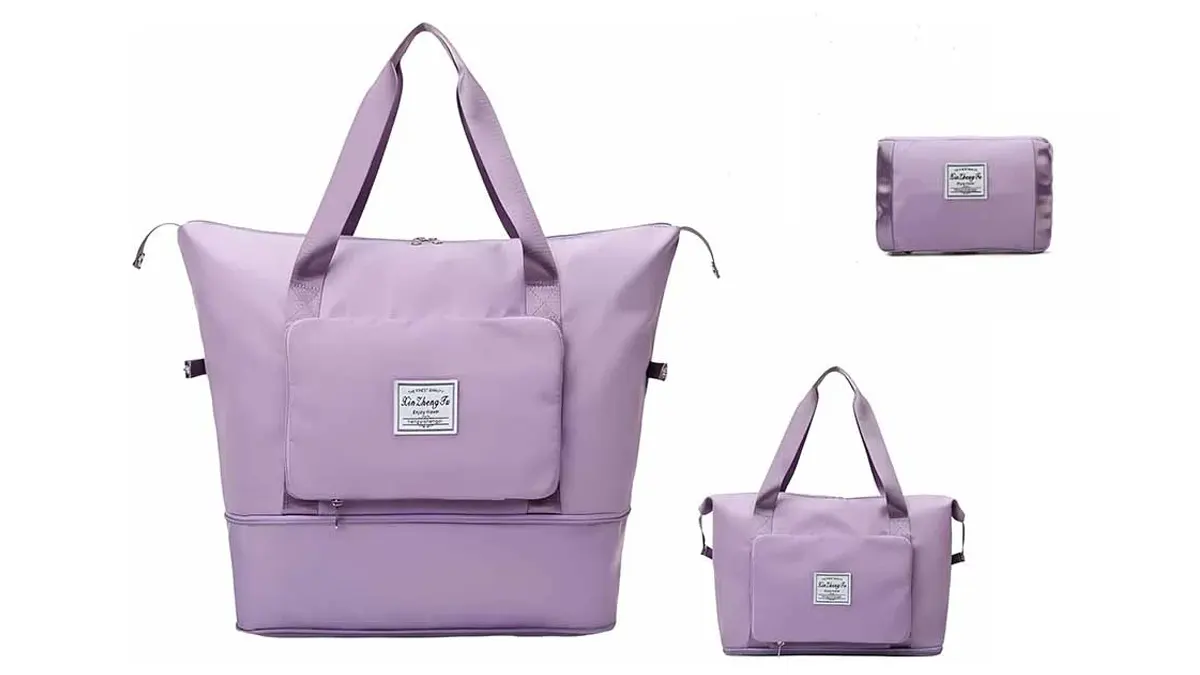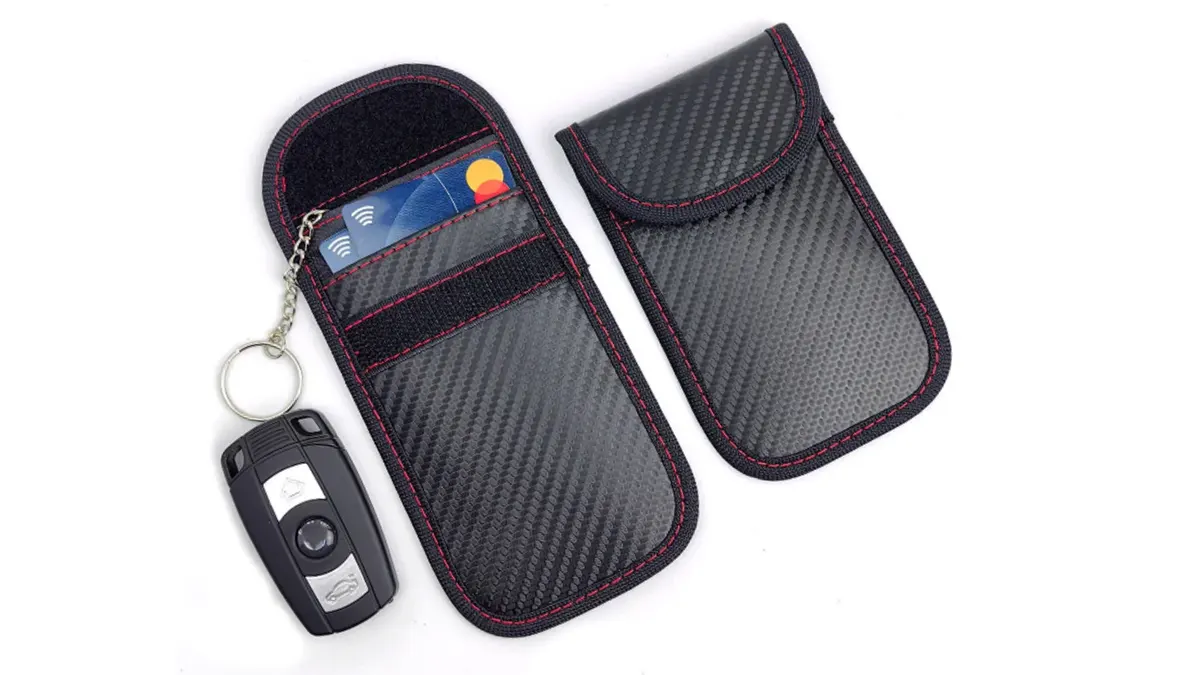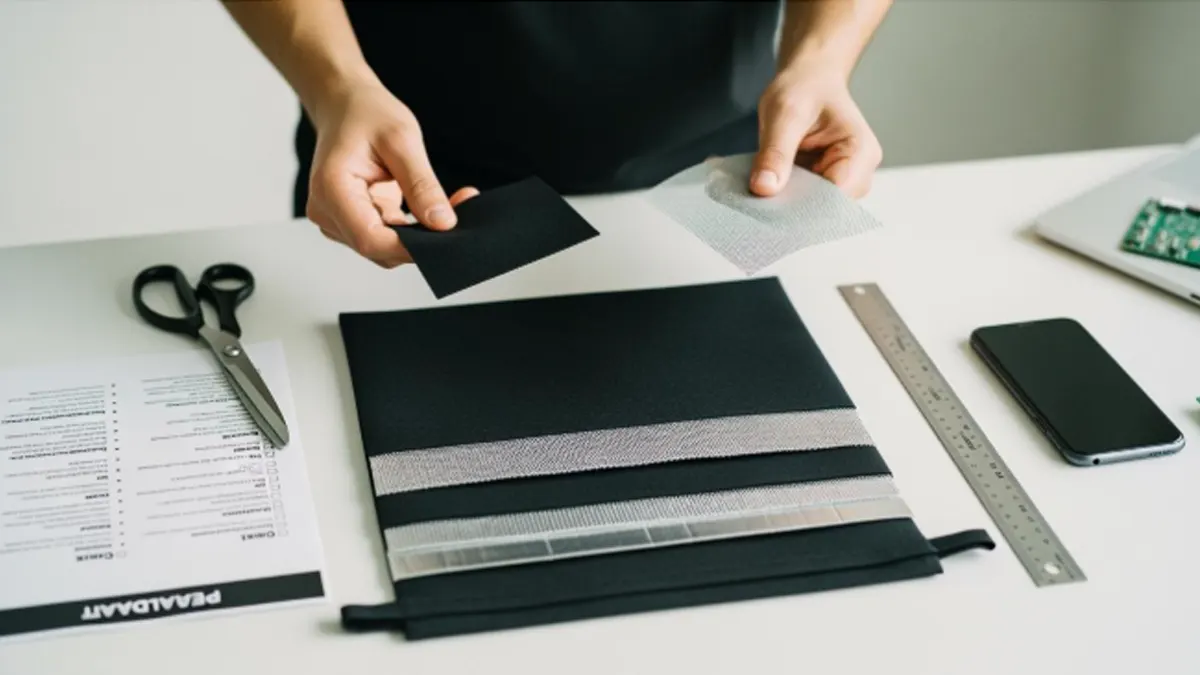When you choose a bag, the material matters more than you might think. Two of the most common options are polyester and cotton. Both materials are widely used in bags, from shopping totes to travel backpacks, and each comes with its own strengths and weaknesses.
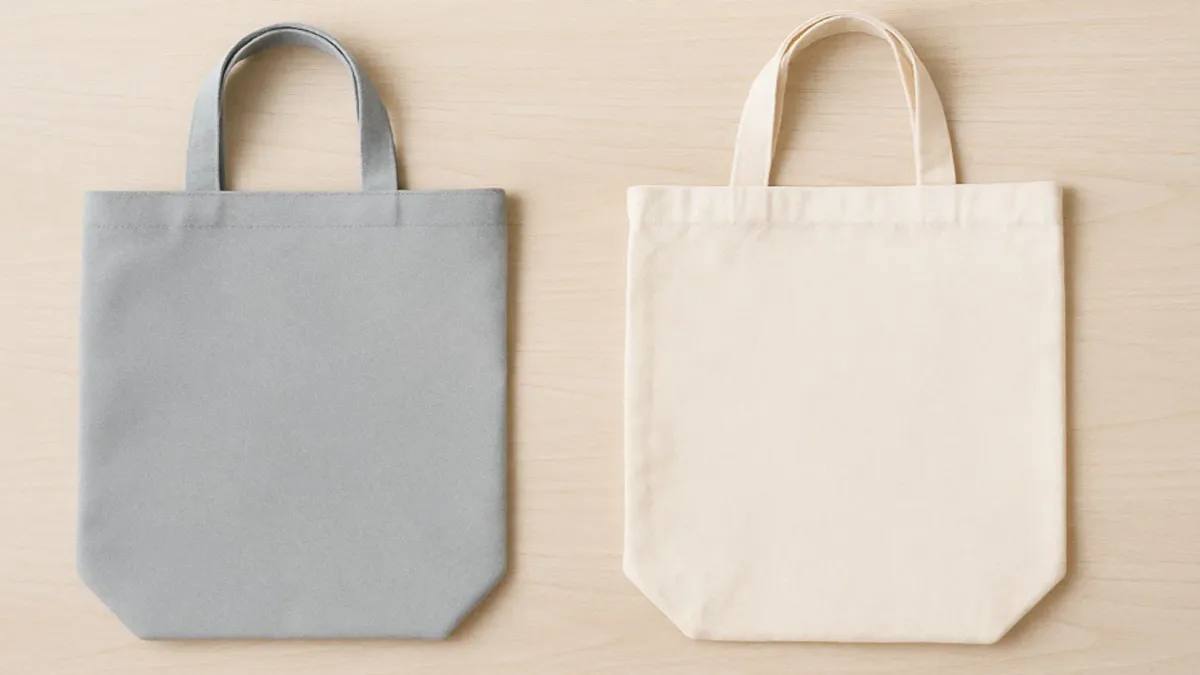
This guide will walk you through the differences between polyester and cotton in bag making. We will cover how each material performs in durability, water resistance, weight, eco friendliness, cost, and daily use. By the end, you will have a clear picture of which material fits your needs best, whether you are buying bags for personal use or considering wholesale options for your business.
We are a professional bag manufacturer, and over years of working with both polyester and cotton, we have seen how each performs in the real world. So let us dive in and compare them side by side.
What is Polyester
Polyester is a man made fiber developed in the mid 20th century. It is created from petroleum based polymers and spun into threads that are then woven or knitted into fabric.
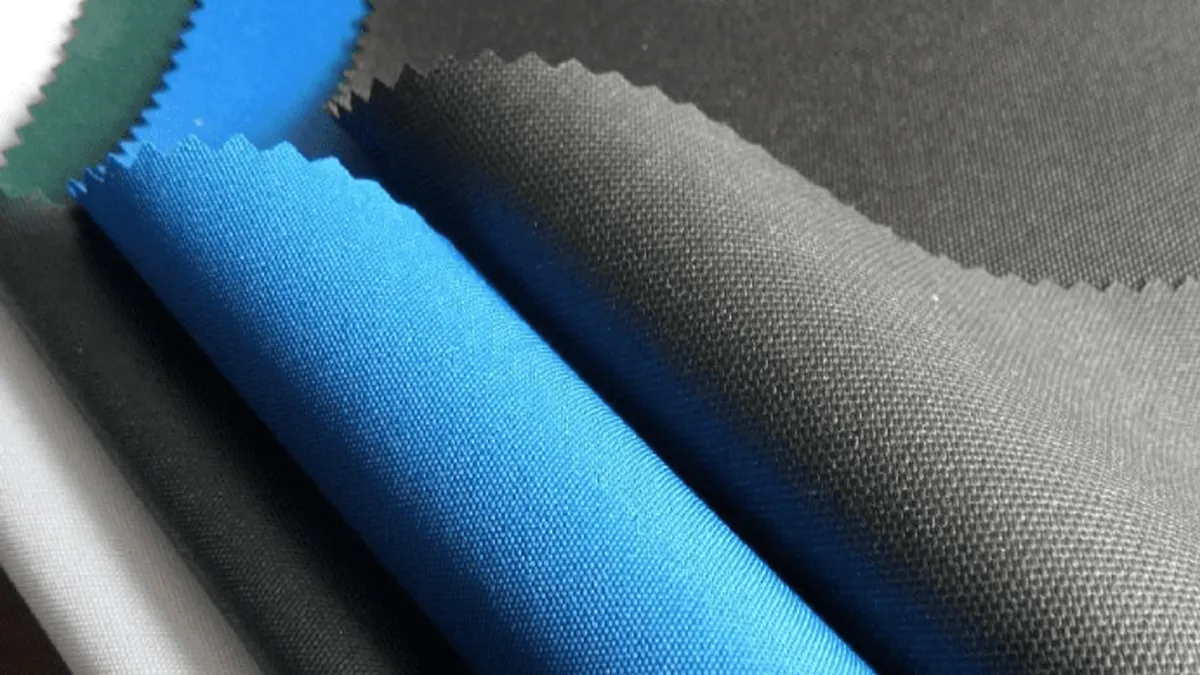
Some key characteristics of polyester:
- Durability: The fibers are strong and resistant to stretching and shrinking.
- Water resistance: Polyester does not absorb water easily, making it quick to dry.
- Wrinkle resistance: It holds its shape and stays neat with minimal maintenance.
- Affordability: Production costs are relatively low, so polyester bags are often budget friendly.
Polyester is commonly found in:
- Sports bags and gym bags
- Travel backpacks and luggage
- Promotional bags and giveaways
- Laptop sleeves and tech accessories
One limitation of polyester is breathability. The fibers do not allow much airflow, which makes polyester less comfortable against the skin for long periods. From an environmental standpoint, polyester is recyclable, but it is not biodegradable.
What is Cotton
Cotton is a natural fiber that comes from the fluffy seed hairs of the cotton plant. It has been used for thousands of years in textiles and remains one of the most popular materials worldwide.
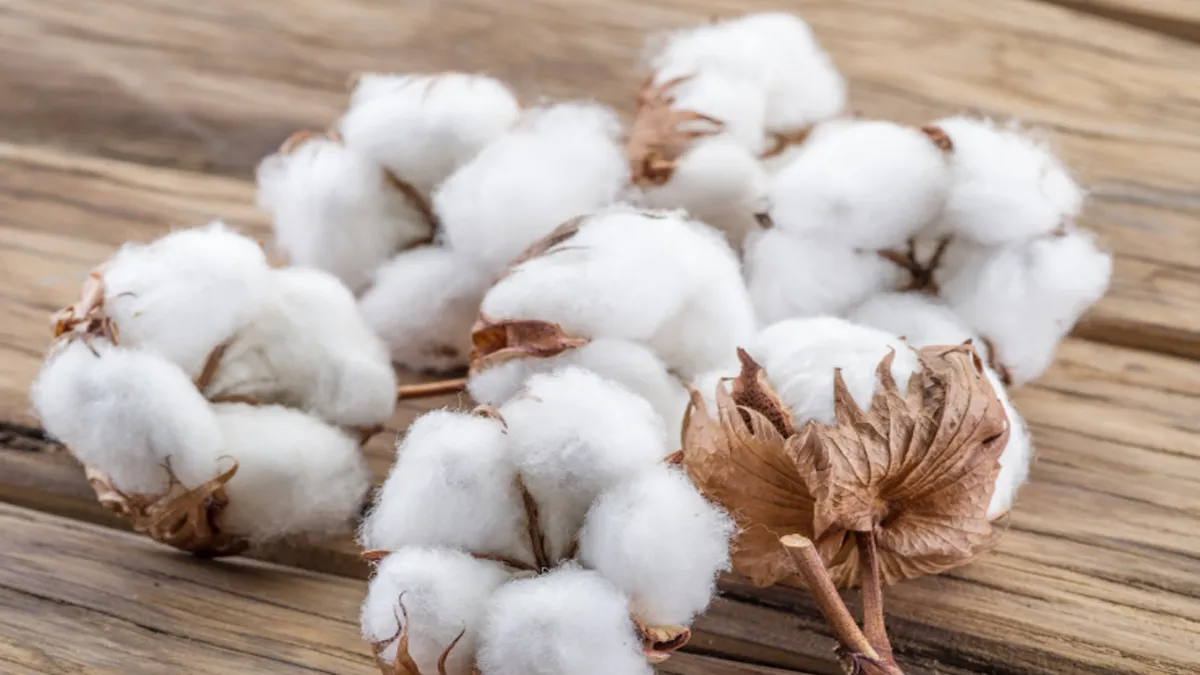
Some defining qualities of cotton:
- Soft and breathable: Cotton fibers allow air to circulate, making the fabric comfortable to carry.
- Eco friendly reputation: Cotton is biodegradable, and organic cotton farming reduces environmental impact.
- Strength: Cotton fibers are tough, especially when woven tightly into canvas.
- Versatility: Cotton can be dyed easily, making it suitable for fashion and branding.
Cotton is often used in:
- Shopping totes
- Canvas backpacks
- Eco friendly promotional bags
- Casual handbags and fashion totes
Cotton has a few downsides. It absorbs water quickly, which can make the bag heavy when wet. It is also more prone to shrinking if washed in hot water, and it requires more care to stay in good condition.
Polyester vs Cotton Side by Side
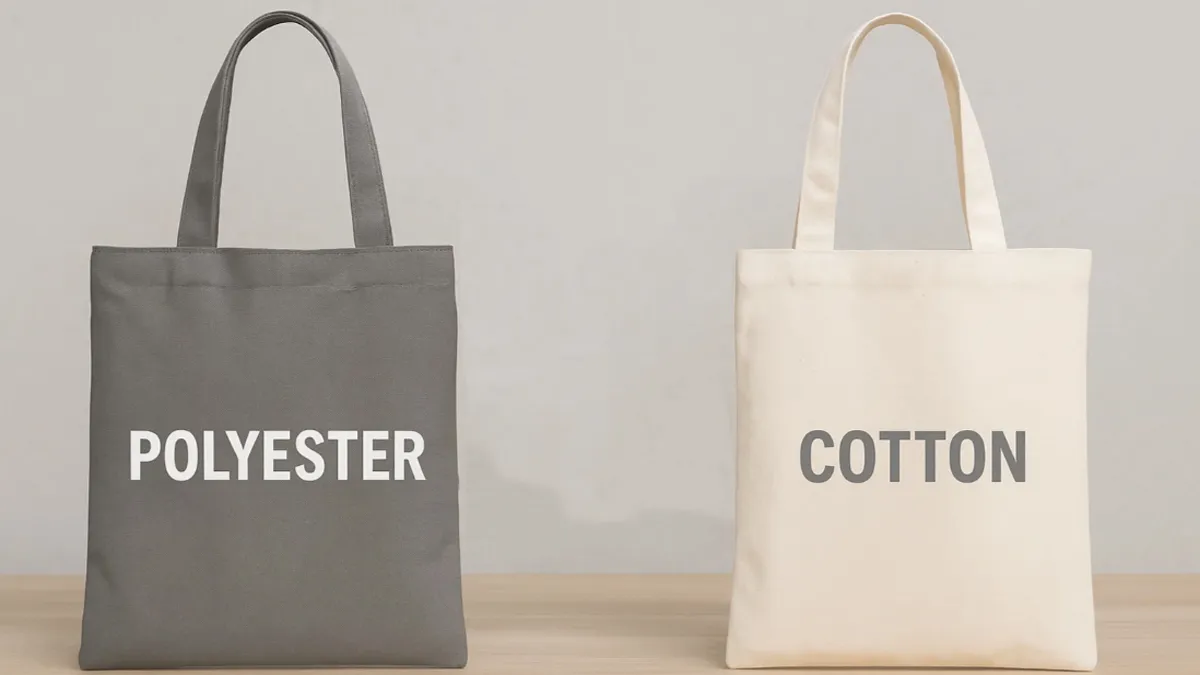
It is easier to see the differences when we compare polyester and cotton directly.
Table 1 Comparison of Polyester and Cotton Bags
| Feature | Polyester Bags | Cotton Bags |
|---|---|---|
| Durability | Very strong resistant to stretching and tearing | Strong but fibers weaken when exposed to water |
| Water Resistance | Naturally water resistant dries quickly | Absorbs water becomes heavy when wet |
| Weight | Lightweight easy to carry | Heavier especially in thick canvas form |
| Eco Friendliness | Synthetic not biodegradable recyclable option | Natural biodegradable eco friendly |
| Maintenance | Easy to clean quick drying low maintenance | Needs more care may shrink requires careful washing |
| Cost | Affordable mass produced widely available | Higher especially organic cotton |
| Common Uses | Travel sports promotional technical bags | Shopping eco totes casual fashion bags |
Durability and Lifespan
If you are looking for something tough, polyester bags are a solid choice. The fibers are strong, resist scratches, and hold their shape even with daily use. That is why polyester is often used in sports and travel bags that need to handle rough conditions.
Cotton bags can also be very durable, especially the ones made from thick canvas. A heavy cotton tote can last for years. The only downside is that cotton does not do well with water. When it gets wet, the fibers weaken and it takes longer to dry. Without proper care, this can shorten the life of the bag. With good care though, a sturdy cotton bag can be just as dependable as polyester.
Water Resistance
If you plan to carry items in rain or damp conditions, polyester has the advantage. The fabric repels water naturally and dries quickly. Many polyester bags are also coated with extra waterproof finishes.
Cotton, on the other hand, absorbs moisture. A cotton bag used in heavy rain will soak through quickly and become heavy. Some cotton bags are treated with water resistant finishes, but untreated cotton does not perform well in wet environments.
Weight and Portability
If you often carry things in the rain or in damp places, polyester will give you an advantage. The fabric naturally repels water and it dries fast, so your bag will not stay wet for long. Many polyester bags even come with an extra waterproof coating, which makes them even more reliable outdoors.
Cotton is a bit different. It soaks up water quickly, so if you are caught in heavy rain, the bag can get heavy and soggy. Some cotton bags are treated with a water resistant finish, which helps a lot, but untreated cotton does not perform well when wet. If you need a bag for rainy days, polyester is usually the safer choice.
Eco Friendliness
These days, a lot of buyers care about sustainability. Cotton really shines here because it is a natural fiber and biodegradable. If you go with organic cotton, it is even better since it is grown without harmful chemicals. That is why cotton bags are often promoted as eco friendly shopping totes, and many stores encourage customers to use them instead of plastic bags.
Polyester is different because it is a synthetic material and it will not break down naturally. The good news is that polyester can be recycled, and some factories now even make it from recycled bottles. Using recycled polyester helps cut down on waste and makes it a greener choice compared to traditional polyester.
Cost Considerations
When it comes to price, polyester bags are usually the more affordable option. The material is inexpensive to make and widely available, so costs stay low. That is why polyester is often the first choice for promotional bags, giveaways, or bulk orders where keeping the budget in check really matters.
Cotton, on the other hand, tends to cost more, especially if you go with organic cotton. The higher price comes from its natural qualities and its eco friendly image. Many businesses that want to appeal to eco conscious customers are willing to pay more for cotton bags because they send the right message about sustainability.
Applications and Use Cases
When deciding between polyester and cotton, it helps to think about where the bag will be used.
- Sports and travel: Polyester is more suitable due to its durability and water resistance.
- Shopping and eco friendly branding: Cotton bags are widely recommended because they align with sustainability trends.
- Promotional events: Polyester works for cheap bulk orders, while cotton works for premium giveaways.
- Fashion and lifestyle: Cotton offers a natural, stylish look, while polyester works for bold prints and sporty designs.
Table 2 Choosing Polyester or Cotton for Different Uses
| Use Case | Recommended Material | Reason |
|---|---|---|
| Sports and gym bags | Polyester | Durable lightweight water resistant |
| Travel backpacks | Polyester | Handles weight well resists wrinkles easy to maintain |
| Shopping totes | Cotton | Eco friendly natural image aligns with sustainability trends |
| Promotional giveaways | Polyester for budget Cotton for premium | Polyester keeps costs low Cotton gives higher value impression |
| Fashion handbags | Cotton | Stylish natural look customizable with dyes and prints |
Tips for Choosing the Right Material
When comparing polyester vs cotton bags, here are some practical tips to guide your choice.
- Think about function. If you need a bag for travel or heavy use, polyester is usually more reliable. If the bag is for light shopping trips or eco branding, cotton is a popular choice.
- Consider your budget. Polyester is cheaper for bulk orders, while cotton has higher upfront costs but offers eco appeal.
- Look at your audience. If your customers value sustainability, cotton may match their values. If they care more about durability and price, polyester may be better.
- Check for customization. Both polyester and cotton can be printed with logos or designs, but cotton absorbs dyes more easily. Polyester requires special printing methods but can deliver bright results.
Conclusion
At the end of the day, there is no one perfect answer. Polyester bags are lightweight, tough, water resistant, and usually easier on the budget. Cotton bags, on the other hand, are natural, eco friendly, comfortable to carry, and have that stylish look many people love. The real question is how you plan to use the bag. If you need something durable for sports, travel, or bulk promotions, polyester is a smart choice. If you want an eco friendly tote for shopping or a brand campaign with a green image, cotton might be the better fit.
As a professional bag manufacturer, we work with both polyester and cotton every day. We know how to design bags that perform well in sports, travel, shopping, or fashion. Whether you want affordable polyester promotional bags or premium cotton eco totes, we can customize them to your needs with OEM and ODM services.
Contact us today for samples or a fast quote. Let us help you create durable, stylish, and practical bags that your customers will love.
FAQ
Is polyester better than cotton for bags?
It really depends on how the bag will be used. Polyester is a synthetic fiber that’s strong, lightweight, and resistant to stretching or shrinking. It’s also water-resistant, which makes it a popular choice for sports bags, travel bags, and food delivery bags where protection from moisture matters. Cotton, on the other hand, is a natural fiber that is soft, breathable, and biodegradable. It’s recommended for eco-friendly shopping totes, giveaways, and casual use because it feels comfortable and aligns with sustainable values. In short, polyester is often chosen for durability and performance, while cotton is chosen for its eco appeal and natural feel.
Are cotton bags really eco-friendly?
Yes, cotton bags are generally considered eco-friendly because cotton is a natural, renewable, and biodegradable fiber. Unlike plastic or polyester, it can decompose without leaving harmful microplastics in the environment. Organic cotton is even better since it is grown without pesticides and often uses less chemical input. However, it’s worth noting that cotton farming can consume a lot of water, so the sustainability of cotton bags also depends on how the cotton was farmed and processed. If used many times, cotton bags can significantly reduce single-use plastic waste, making them a popular choice for sustainable shopping and brand promotions.
Do polyester bags last longer than cotton bags?
Polyester bags usually last longer under heavy use because the fiber is resistant to shrinking, stretching, and wrinkling. Polyester fabric is strong, quick-drying, and less likely to tear, which is why it’s widely used in backpacks, sports bags, and travel gear. Cotton bags, while durable, require more care—they should be kept dry and washed carefully to avoid damage. If well maintained, cotton bags can also last for years, but they are more sensitive to moisture and frequent washing. So, for heavy-duty, daily use polyester generally outperforms cotton in longevity, while cotton works best for lighter, eco-conscious use.
Which is cheaper, polyester or cotton?
Polyester is generally more cost-effective to produce, which makes polyester bags cheaper in most cases, especially when ordering in bulk. The fiber is manufactured at large scale, which lowers the price for wholesale buyers. Cotton, especially organic cotton, tends to be more expensive because it’s a natural fiber and requires more resources to grow and process. While cotton bags cost more, they offer strong eco appeal, which makes them a good fit for brands or campaigns focused on sustainability. Polyester, meanwhile, is preferred for projects that require affordability, durability, or very large order volumes.
Which is easier to print logos on?
Cotton bags are usually easier to customize with logos because cotton absorbs inks and dyes very well. Techniques like screen printing, digital printing, or embroidery can all be applied effectively to cotton fabric. The surface allows for bold colors and long-lasting prints, which is why cotton tote bags are widely used for promotional purposes. Polyester can also be printed, but it often requires different methods such as heat transfer, sublimation, or special inks designed for synthetic fabrics. While polyester printing can achieve vibrant results, it’s typically more technical compared to printing on cotton. For simple, cost-effective logo customization, cotton is usually the preferred choice.

